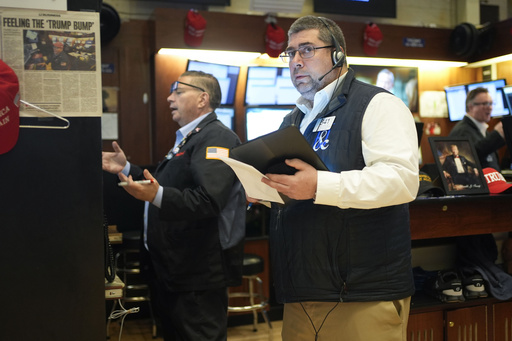
NEW YORK — A sense of calm has settled over Wall Street, with tech stocks significantly boosting major U.S. market indexes. The S&P 500 saw an increase of 0.7% on a recent Tuesday, following a turbulent day driven by concerns that tariffs imposed by President Trump could trigger a detrimental trade war impacting economies globally. The Dow Jones Industrial Average experienced a modest rise of 0.3%, and the Nasdaq composite surged by 1.4%. On Monday, Trump opted to delay tariffs affecting Canadian and Mexican imports for a month while maintaining his stance against China, which responded with its own tariffs. The strong profit report from Palantir Technologies played a pivotal role in leading the S&P 500’s ascent.
Throughout the trading session, tech stocks emerged as a powerful force, witnessing a boost from Palantir Technologies, a company strongly positioned within the burgeoning field of artificial intelligence. By early afternoon, the S&P 500 had risen by 0.5%, following volatile trading that was affected by concerns surrounding potential trade conflicts. Similarly, the Dow Jones Industrial Average experienced an uptick of 46 points, equivalent to a 0.1% increase, while the Nasdaq composite rose by 1.1%.
President Trump’s decision to postpone tariff implementation on imports from Canada and Mexico was made public just after the previous day’s trading ended, igniting renewed optimism among traders who hoped that Trump’s aggressive rhetoric on tariffs may be more for negotiation purposes than a permanent policy change. This sentiment is partly predicated on the belief that the President would be dissuaded from pursuing a long-term trade war, recognizing the negative effects it could have on market performance — a metric Trump has previously cited as reflective of his administration’s approval.
Despite this hopeful outlook, the potential for a trade war remains, prompting analysts to caution investors. They believe Trump’s statements regarding tariffs should be taken seriously, as any detriment to financial markets could provoke a swift policy reversal. A report from strategists at Bank of America noted that the administration is transactional, indicating that “nothing is settled until it is final.”
Trump is also moving forward with a 10% tax on U.S. companies importing products from China, which has retaliated by announcing its own tariffs against U.S. imports along with an antitrust investigation into Google. However, certain tariffs, including a 15% tariff on U.S. coal and liquefied natural gas, as well as a 10% tariff on other products such as crude oil and agricultural machinery, won’t be enacted until later in the week, allowing more time for negotiations.
Some financial analysts view Trump’s tariffs on China as potentially more long-lasting compared to those imposed on other trading partners, reflecting the desire to draw a clearer line in the sand against a global rival. Conversely, the impact on relationships with allies such as Canada, Mexico, and the European Union is expected to result in more negotiations rather than outright tariffs, according to insights from Macquarie strategist Thierry Wizman.
The market also reflected movements in individual stocks. Alphabet, Google’s parent company, saw its shares climb by 1.8% as anticipation builds for its upcoming financial results. Meanwhile, previously fluctuating stocks, notably in the automotive sector, demonstrated stability following a day of volatility stemming from tariff concerns. General Motors’ stock rose by 1.6%, and Ford Motor climbed by 2.3%.
Shifting focus to corporate earnings, Palantir Technologies’ stock surged by 22.1%, serving as a significant contributor to the S&P 500’s rise after exceeding analyst profit expectations and providing optimistic revenue forecasts amid its positioning within the artificial intelligence sector. In contrast, pharmaceutical giant Merck faced a setback, with its stock declining by 9.9% despite reporting higher-than-expected sales and earnings. The disappointment stemmed from a revenue forecast that fell short, partly due to halted shipments of one of its top products to China.
In the wider bond market, Treasury yields dipped, reflecting data suggesting less upward pressure on inflation in the job market. Job openings reported at the end of December were fewer than anticipated, indicating a cooling yet still sustainable labor market. Consequently, the yield on the 10-year Treasury settled at 4.52%, down from 4.56%, while the two-year yield also eased to 4.22% from 4.25%.
Internationally, markets exhibited mixed results; London’s FTSE 100 experienced a slight decline of 0.1%, whereas other significant European markets saw minor gains. In Asia, however, Hong Kong’s Hang Seng Index enjoyed a notable increase of 2.8%, alongside a 1.1% rise in South Korea’s Kospi index.

